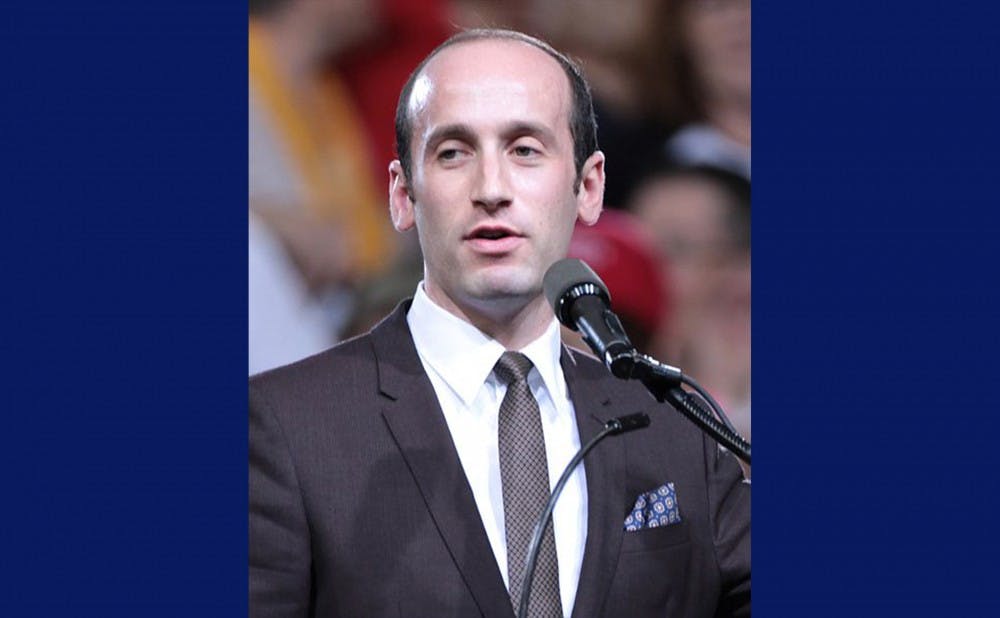Stephen Miller, Trinity '07 and a senior policy adviser to President Donald Trump, features consistently in special counsel Robert Mueller's report on Russian interference in the 2016 presidential election.
The special counsel's report, which was released publicly April 18, covers the findings of the special counsel's two-year investigation into Russian interference in the first of its two volumes. The second volume lays out President Donald Trump's actions toward the FBI's and special counsel's investigations, which included potential attempts to interfere with them.
Miller is featured more prominently in the second volume of the report that focuses on whether Trump illegally obstructed the FBI's Russia investigation. Miller was interviewed as part of Mueller's investigation in October 2017, in a discussion that focused on Trump's firing of former FBI Director James Comey.
In that interview, Miller told the special counsel that Trump was upset over Comey's March 2017 testimony in front of the House Intelligence Committee. During the hearing, Comey refused to clarify whether Trump was personally under FBI investigation, contrary to what Comey had told the president at the end of the Jan. 6, 2017, intelligence assessment briefing.
Miller drafted the original version of Comey's termination letter, which was the focus of significant scrutiny in the special counsel's investigation. According to the report, Miller wrote the first draft of the letter based on notes that he took during a dinner with Trump at the president's resort in Bedminster, N.J.
After the dinner and with his own research, Miller prepared the letter in defense of Trump's arguments to fire Comey—which formally focused on Comey's handling of the investigation into Hillary Clinton's use of a private email server during her time as secretary of state. Trump later told senior advisers that Miller had determined that the president had the authority to fire Comey without cause.
The Mueller report concluded that the special counsel's investigation did not find evidence to fully support the justifications given in the letter—and that the Russia investigation played a greater role than Miller's letter claimed.
"The initial reliance on a pretextual justification could support an inference that the President had concerns about providing the real reason for the firing, although the evidence does not resolve whether those concerns were personal, political, or both," the report states.
Meanwhile, the first volume of the report does not mention Miller as much. Miller joined the Trump campaign in January 2016, but there are only sixteen references to him in the volume of the report dedicated to exploring possible coordination between Russia and the campaign.
In the most striking instance of Miller's involvement with Russian contacts, the report states that Jared Kushner, Trump’s son-in-law and senior advisor, put Miller in touch with Dimitri Simes, CEO and president of the Center for the National Interest (CNI). The CNI, a foreign policy think tank, has "unparalleled access to Russian officials and politicians among Washington think tanks," according to the report.
Ahead of an event potentially hosted by CNI and attended by Trump, Miller took advice from CNI executives, including Simes, about a foreign policy speech that Miller had prepared for Trump to give at the event.
Among the other references to Miller, most involve other key figures in the campaign—or in Trump's business dealings—forwarding him emails related to Russian contacts.
In April 2016, George Papadopoulos—a member of the foreign policy advisory panel to Trump's 2016 campaign who later pled guilty to making false statements to the FBI about his contacts with Russians during the campaign—sent Miller two emails discussing a meeting between Trump and Russian President Vladimir Putin.
"Papadopoulos wrote to senior policy advisor Stephen Miller that '[t]he Russian government has an open invitation by Putin for Mr. Trump to meet him when he is ready,'” the report states.
A month later, in May 2016, longtime Trump aide Rhona Graff forwarded Miller an email from banker Robert Foresman inquiring about a meeting with one of the president's sons. According to the report, Foreman had been contacted by Anton Kobyakov, a Russian presidential aide, to see if then-candidate Trump would speak at the St. Petersburg International Economic Forum, an annual business conference supported by the Russian government.
In neither case did Miller follow up on the emails—or if he did, his follow-ups are not laid out in the report.
However, Miller may have played a role in hiding evidence of those contacts from the public eye.
Soon after the 2016 election, Trump spokeswoman Hope Hicks publicly denied all communication between the Trump campaign and "any foreign entity." According to the report, Hicks spoke to Miller—among other Trump advisors—about the accuracy of the statement, and did not receive any pushback about the statement from Miller.
The Chronicle was unable to reach Miller for comment after two calls to his personal phone number and two attempts to contact him via the White House switchboard. Miller also did not return a request for comment sent through his personal LinkedIn profile.
Get The Chronicle straight to your inbox
Signup for our weekly newsletter. Cancel at any time.
Carter Forinash, Trinity '21, was the news editor for The Chronicle's 116th volume.

